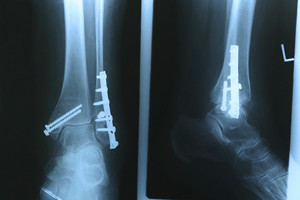Garner (919) 661-4150
Typical Ankle Injuries to Be Aware Of
Tuesday, 15 June 2021 00:00The ankle is comprised of muscles, bones, tendons, ligaments, and cartilage—all of which can become injured in different ways with varying degrees of ankle pain. Superficial cuts, bruises, and abrasions usually produce mild pain, whereas deeper lacerations can be more painful, penetrating the skin and possibly requiring stitches. Ankle strains, or pulled muscles, occur when muscles have been overstretched or torn, and can cause moderate pain. Ankle sprains are more serious and often more painful as ligaments are damaged and splinting or casting may be necessary to heal properly. When a bone becomes dislocated, it pops out of the joint, causing severe pain, and requires professional attention. Similarly, when a bone in the ankle is broken (fractured), it can be severely painful and swollen, also requiring medical attention. With an Achilles tendon rupture, there may be a popping sound at the moment of injury and pain may range from mild to moderate. If you have injured your ankle, it is suggested that you contact a podiatrist to examine and assess the injury and create an appropriate treatment plan.
Ankle pain can have many different causes and the pain may potentially be serious. If you have ankle pain, consult with Chukwuma Ukata, DPM from Advanced Carolina Foot and Ankle Center. Our doctor will assess your condition and provide you with quality foot and ankle treatment.
Ankle pain is any condition that causes pain in the ankle. Due to the fact that the ankle consists of tendons, muscles, bones, and ligaments, ankle pain can come from a number of different conditions.
Causes
The most common causes of ankle pain include:
- Types of arthritis (rheumatoid, osteoarthritis, and gout)
- Ankle sprains
- Broken ankles
- Achilles tendinitis
- Achilles tendon rupture
- Stress fractures
- Tarsal tunnel syndrome
- Plantar fasciitis
Symptoms
Symptoms of ankle injury vary based upon the condition. Pain may include general pain and discomfort, swelling, aching, redness, bruising, burning or stabbing sensations, and/or loss of sensation.
Diagnosis
Due to the wide variety of potential causes of ankle pain, podiatrists will utilize a number of different methods to properly diagnose ankle pain. This can include asking for personal and family medical histories and of any recent injuries. Further diagnosis may include sensation tests, a physical examination, and potentially x-rays or other imaging tests.
Treatment
Just as the range of causes varies widely, so do treatments. Some more common treatments are rest, ice packs, keeping pressure off the foot, orthotics and braces, medication for inflammation and pain, and surgery.
If you have any questions, please feel free to contact our office located in Garner, NC . We offer the newest diagnostic and treatment technologies for all your foot care needs.







